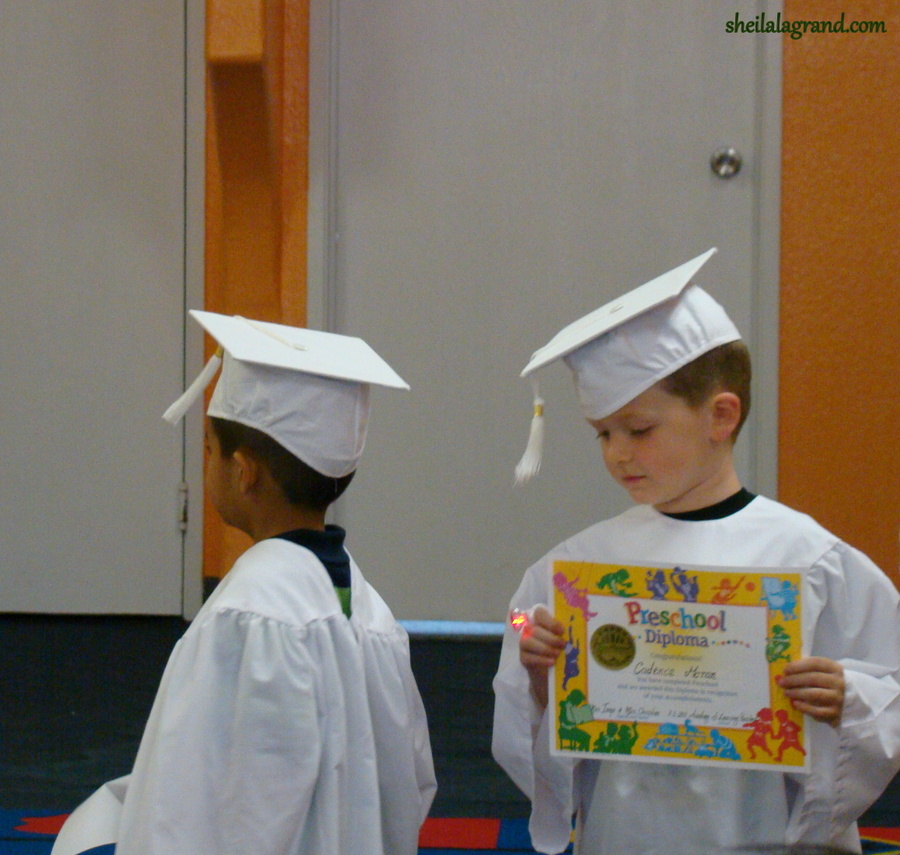Cadence “Graduates” From Preschool. June 2011.
If you have a child or grandchild who plays baseball, dances, or draws interesting shapes in Pre-Preschool, you may have noticed that every child receives a trophy at the season-end banquet/playdate/ice cream party. And isn’t it sweet that every single child is called forward to receive a special award at year-end festivities?
No, it really isn’t so sweet. When we’re handing out trophies for biggest smile in the dugout, something is wonky. When a child receives a trophy for most optimistic bench-sitting, we see that the awards committee has grasped into thin air to create categories that celebrate each child. Celebrating each child is a wonderful thing–but we’re celebrating the wrong aspect of each child.
Here’s why I’d like to ditch the trophies-for-all practice:
1. (Universal) trophies teach children that the valuable thing about them is what they do. I want our children to know that they’re loved and celebrated for who they are. Achievements are grand, and significant achievements are significantly grand, but they’re ephemeral. Who can’t name a band that proved to be a one-hit wonder or an athlete whose promising career fizzled after an injury? When we build a child’s self-worth on achievement, we’re raising a rickety structure.
2. Conversely, (universal) trophies teach children that you’ll be acknowledged and celebrated no matter what you did. The confusing part about carpet-bombing children with trophies is that we celebrate what they did and demonstrate that how well they did it doesn’t really matter. Take the baseball team, the show choir, the dancers, any team or club at all, and the children can instantly tell you who the best players/singers/dancers are. What do we say about the value of achievement when every child receives an award?
3. (Universal) trophies foster a busier-is-better lifestyle. When you receive a trophy for showing up, or maybe just for signing up, you learn that the important thing is to do lots of things. This practice downplays both free time and excellence, two important concepts. Encourage children to try different things, of course; but please, also teach them the value of white space in their schedules. Go for a walk and count the birds. Listen to music. Pitch a tent in the back yard and take a nap in it. Encourage children to seek excellence in the things they do, yes; but please don’t teach them that every faltering effort is the most awesome thing you’ve ever seen.
So what might the awards party look like if only a few children are singled out for awards? First, we might consider whether seven-year-olds really need an awards party at the end of every season, but that’s a post for another day. Three trophies might be enough for a baseball team: best fielding (or defense), best batting (or offense), and most improved. Every child receives a certificate of participation, acknowledging that they came and did their part. The children present a thank-you gesture to the coaches who invested their time in the team. Then everyone eats a cookie and goes home.
Effort and achievement matter, and children need to learn that. But children must learn something more basic than the value of hard work. It’s the foundation upon which confident adults are built. It’s maybe the single most important thing grandparents can help their grandlittles understand about themselves. And it’s the exact same thing that God wants us to know about ourselves. The message is this:
I love you because you are mine. The simple fact that you are makes you a treasure beyond price.
38 For I am sure that neither death nor life, nor angels nor rulers, nor things present nor things to come, nor powers, 39 nor height nor depth, nor anything else in all creation, will be able to separate us from the love of God in Christ Jesus our Lord.
Romans 8:38-39 (ESV)






Another reason is that the bigger accomplishments are undermined. I remember going to a high school graduation and being shocked that the cap and gown were black! Black was supposed to be only for college graduations! I’m also still shocked whenever schools have kindergartners wear a cap and gown. The cap and gown was supposed to be reserved for high school graduation. Even when I finished junior high, we were not allowed to wear a cap and gown (but our parents bought us fancy graduation clothes). That made the high school cap and gown all the more meaningful. None of us had ever worn a mortar board or turned a tassel before then.
Monica, thanks for your comment. You make an excellent point! When everyone wins all the time, winning means nothing.
I didn’t know that black was reserved for college graduations. But my first cap and gown was definitely for high school graduation. Previous “endings” were called “promotions,” not “graduation,” probably for the reason you mention here.